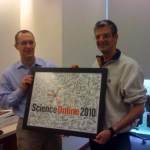science reporting
There are fascinating threads of comments developing on these two posts:
Science journalism pet peeve
and
Do arrogant, condescending, and dismissive attitudes contribute to the journalism crisis?
If you have bookmarked the quick guide to the maxims of new media you will easily find the origin of the phrase "Do what you do best and link to the rest." - Jeff Jarvis in this 2007 post.
For the origin of the reluctance of MSM to link outside their own websites, watch this video.
For my own thoughts on this topic, informed by my experiences as "media tracker" for PLoS ONE, see Why it is important…
June edition of the Journal of Science Communication is out. Focus seems to be on communication in physical space and democracy. Check out the table of contents:
Bringing the universe to the street. A preliminary look at informal learning implications for a large-scale non-traditional science outreach project:
"From Earth to the Universe" (FETTU) is a collection of astronomical images that showcase some of the most popular, current views of our Universe. The images, representing the wide variety of astronomical objects known to exist, have so far been exhibited in about 500 locations…
The Essence of Online Science Journalism
View more presentations from miriamboon.
From a lecture by Miriam Boon
Reposted, as I needed to add several of the most recent posts to the list - see under the fold:
As this blog is getting close to having 10,000 posts, and my Archives/Categories are getting unweildy (and pretty useless), I need to get some of the collections of useful posts together, mainly to make it easier for myself to find them. I did that by collecting my best Biology posts a couple of weeks ago. Today, I am collecting my best posts from the categories of Media, Science Reporting, Framing Science and Blogging. There are thousands of posts in these categories combined, most with excellent…
Ever have one of those times when you have a cool new blog post all ready in your head, just needs to be typed in and published? Just to realize that you have already published it months ago? Brains are funny things, playing tricks on us like this. I just had one of such experiences today, then realized that I have already posted it, almost word-for-word, a few months ago. It's this post. But something strange happened in the meantime: that post, in my head, got twice as long and changed direction - I started focusing on an aspect that I barely glossed over last time around. So perhaps I need…
Continuing with the tradition from last two years, I will occasionally post interviews with some of the participants of the ScienceOnline2010 conference that was held in the Research Triangle Park, NC back in January. See all the interviews in this series here. You can check out previous years' interviews as well: 2008 and 2009.
Today, I asked Alex from Miss Baker's Biology class at Staten Island Academy to answer a few questions. You can read about Alex's experience at ScienceOnline2010 here.
Welcome to A Blog Around The Clock. Would you, please, tell my readers a little bit more about…
Last week I went to Sigma Xi to hear Dennis Meredith speak about Explaining Research. I posted my summary of his talk over on Science In The Triangle blog so click on over.....
The New York Times Reader: Science & Technology by Holly Stocking is now out:
Science writing poses specific challenges: Science writers must engage their audiences while also explaining unfamiliar scientific concepts and processes. Further, they must illuminate arcane research methods while at the same time cope with scientific ignorance and uncertainty. Stocking's volume not only tackles these challenges, but also includes extraordinary breadth in story selection, from prize-winning narratives, profiles and explanatory pieces to accounts of scientific meetings and new discoveries, Q…
Since I don't do PowerPoint but use the Web for presentations instead, and since the recordings from AAAS are not free (yes, you can buy them, I won't), and since some people have asked me to show what I showed at my panel there, here is the list of websites I showed there. I opened them up all in reverse chronological order beforehand, so during the presentation itself all I needed to do was close each window as I was done with it to reveal the next window underneath.
I started with http://www.scienceonline2010.com/ to explain the new interactive, collaborative methods in science journalism…
As this blog is getting close to having 10,000 posts, and my Archives/Categories are getting unweildy (and pretty useless), I need to get some of the collections of useful posts together, mainly to make it easier for myself to find them. I did that by collecting my best Biology posts a couple of weeks ago. Today, I am collecting my best posts from the categories of Media, Science Reporting, Framing Science and Blogging. There are thousands of posts in these categories combined, most with excellent links or videos, but here are some of the posts that have substantial proportion of my own…
Science in the Media: Rude or Ailing Health? was a panel that recently convened in the UK, in a response to a recent UK government report on science in the media . You can watch the video of the entire thing at this link.
The panelists were Natasha Loder of the Economist, Andrew Jack of the Financial Times, Fiona Fox of Science Media Centre (and the author of the report) and Ed Yong of Not Exactly Rocket Science blog.
It is interesting to watch and there is much one can say. But it is unfortunate that there was a part of the panel proceedings that descended into the old tired journalists vs.…
Science Communicators of North Carolina and Sigma Xi, The Scientific Research Society, present:
"Using Multimedia to Advance Your Research" -- and - "Adventures in Self-Publishing"
By Dennis Meredith, author of Explaining Research: How to Reach Key Audiences to Advance Your Work (Oxford University Press)
April 26, 2010, 6:00 p.m.
Sigma Xi Center, RTP
Dennis Meredith drew a standing-room-only crowd when he talked at the 2010 AAAS meeting about the role of multimedia in research. We've prevailed on Dennis, formerly of Duke University, to reprise his presentation for the home-state crowd.
From…
Good stuff to keep you occupied over the next couple of days:
Systemic issues in science journalism - the reinforcing cycle of niche reporting
Investigative science journalism
The Bias of Veteran Journalists
Dangerous DNA: The truth about the 'warrior gene'
The Language of Science - it's 'just a theory'
Should journalists report on unpublished research?
Joe McLaughlin will be an excellent journalist
Scientists Embrace Openness with a good vibrant discussion of both Open Science and Open Journalism on FriendFeed.
Home Libraries Provide Huge Educational Advantage
Why Do We Dream?
NSF governing…
In his ongoing series, Colin Schultz posted two excellent interviews, with Ferris Jabr and with Ed Yong. Both interviews are long-ish, and cover a lot of ground, e.g., about the importance of the "news hook" for science stories, the role of PIOs and press release sites, and the useless blogging vs. journalism wars.
This was a busy, crazy week.
On Monday and Tuesday I was in Boston. You may remember I went to Boston last year as well and for the same reason - spending a day at the WGNH studios, helping with the World Science project that combines radio, podcasts and online forums. You have probably noticed I have posted announcements of these throughout the year.
A short story airs on the radio show The World, about some science-related topic with a global angle. The same scientist (or physician, or science journalist) who is interviewed for a couple of minutes on air is also interviewed for 20 minutes…
Journalism has always been communal
Top Google queries about scientists: should we be surprised?
Getting more out of scientific content
Telling tales...
The Science Reader: A Crowd-Sourced Profile
Journalism and the public understanding of how science works. A suggested remedy.
So what do the journalists and scientists think?
Evaluating science journalism - with a Matrix!
Ed Yong, Colin Schultz, & More: A bloggitty twitterview conversation on sci-journalism, awesomeness, dirt digging, and wonkiness.
Understanding push-pull market forces and promoting science to under-served audiences
Push…
Danielle Lee, who just defended her PhD last week (her defense was livestreamed and livetweeted and liveblogged - Congratulations!!!!!!!!!) wrote a very thought-provoking post this morning - Understanding push-pull market forces and promoting science to under-served audiences. Go read it now.
If general public will not actively seek science content ('pull') than perhaps we can have the content come to them wherever they are ('push'). But people are scattered over gazillions of media places! How do we get to them everywhere? One answer is to try to get many people to contribute science-y…
Elia Ben-Ari, on her 'To Be Determined' blog, wrote an excellent, thought-provoking post on the fine distinctions between science journalists and Press Information Officers: More on the Science Journalism Ecosystem and What Is and Is Not Science Journalism
...And an understanding of the underlying science is certainly helpful in reporting the "something smells fishy" stories as well as the "wow, that's neat" stories. I maintain that one person can and may do both types of science reporting, so it doesn't make sense to separate "investigative journalism" from "science journalism."...…
Lots of interesting stuff this week, so I decided to put everything in a single post - makes it easier for everyone....
First, there was a very nice article in Columbia Journalism Review (which someone subscribed me to - I guess because my name appeared there the other week....someone is trying to remind me how it feels to read stuff written on actual paper!) about the beginning of a resurgence of science journalism in North Carolina. The article covers all the bases, focusing mostly on the new Monday science pages produced collaboratively by The Charlotte Observer and the Raleigh News &…
Almost a year ago, Nature published a set of opinion articles, including Science journalism: Toppling the priesthood by Toby Murcott. I did not react at the time, but JR Minkel and Jessica Palmer did and got some interesting responses in the comments. The article was brought to my attention by Gozde Zorlu who is ruminating on the same ideas and will have a blog post about it shortly (and I will let you know when it's up).
The article covers a lot of ground and has many layers. I finally read it and these are just some really quick thoughts, just to provoke discussion.....
First, Murcott is…

